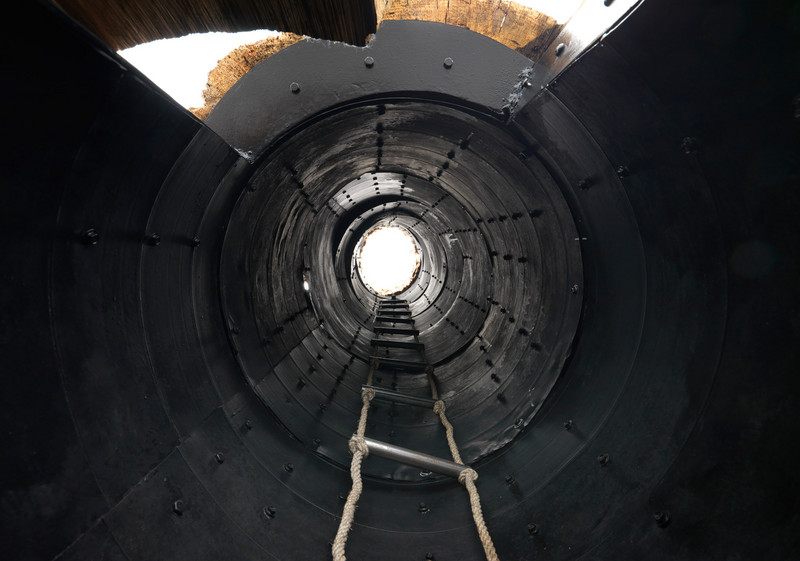Laurent Montaron
20 Sep - 01 Nov 2014
LAURENT MONTARON
Everything Is Accidental
20 September - 1 November 2014
SCHLEICHER/LANGE is delighted to announce a solo show by the French artist Laurent Montaron at the gallery. The work of Laurent Montaron is su_used with the contemporary history of the media. Through his investigations of the tools that shape our representations Montaron lays bare the paradoxes that accompany our awareness of modernity.
At the center of this solo show is his new film work and installation “Nature of the Self” (2014) realized during his residency at the French Academy in Rome | Villa Medici in Autumn 2013. With di_erent interwoven sequences: a speleologist, a man shown conducting the chemical process used to make a mirror, and two girls examining insects using a slide projector, the film shifts between light and darkness. The accompanying voiceover describes an experience of depersonalisation disorder in front of a mirror. This moment of reflection ushers metaphysical and existential uncertainty, questioning the ever-evolving nature of the inner self and the relation which the experience ties with the eyes of the others. Here, the eye is both a physical and metaphorical construct, and the blind spot introduced in the opening passage denotes this paradox; it is “that which you do not see and you do not know that you do not see.” The film itself is viewed through a window within the gallery space. Sound and image are disconnected where the space of the projection is not the space for viewing.
Montaron's works draw from the history of technology to examine systems of belief, investigating the ways in which innovations have continually given rise to new ways of observing and understanding the world. Often engaging obscure and outmoded devices, his works foreground the presence of the apparatuses used to create them, drawing attention of the act of recording as an attempt to render experience into information.
Maintaining the inextricable link between the themes he explores in his works and the processes involved in their construction.
The duration of the film provides the rhythm for reading and observing the gallery room behind a partition wall and consequently the other two works located there. Montaron creates a physical trajectory for the observer confronted at alternating times with multiple mediums. “Kalender” (2104) a large format photograph which shows a child drawing on his leg a mnemotechnic scale of time, literally marking the passage of time._The image underlines the place of the analogy in the constitution of the memory and is juxtaposed by the physical presence of a replica camouflaged observation tree from the First World War. Modes of communication and representation, the passages of time and transition into space, Montaron gathers objects from the boundaries of modernity.
This is Laurent Montaron’s fifth solo exhibition at SCHLEICHER/LANGE, following recent exhibitions at Mercer Union, a centre for contemporary art, Toronto (solo) (2014), the 19th Sydney Biennale (2014) and “The Enclopediac Palace”, Venice Biennale (2013).
Everything Is Accidental
20 September - 1 November 2014
SCHLEICHER/LANGE is delighted to announce a solo show by the French artist Laurent Montaron at the gallery. The work of Laurent Montaron is su_used with the contemporary history of the media. Through his investigations of the tools that shape our representations Montaron lays bare the paradoxes that accompany our awareness of modernity.
At the center of this solo show is his new film work and installation “Nature of the Self” (2014) realized during his residency at the French Academy in Rome | Villa Medici in Autumn 2013. With di_erent interwoven sequences: a speleologist, a man shown conducting the chemical process used to make a mirror, and two girls examining insects using a slide projector, the film shifts between light and darkness. The accompanying voiceover describes an experience of depersonalisation disorder in front of a mirror. This moment of reflection ushers metaphysical and existential uncertainty, questioning the ever-evolving nature of the inner self and the relation which the experience ties with the eyes of the others. Here, the eye is both a physical and metaphorical construct, and the blind spot introduced in the opening passage denotes this paradox; it is “that which you do not see and you do not know that you do not see.” The film itself is viewed through a window within the gallery space. Sound and image are disconnected where the space of the projection is not the space for viewing.
Montaron's works draw from the history of technology to examine systems of belief, investigating the ways in which innovations have continually given rise to new ways of observing and understanding the world. Often engaging obscure and outmoded devices, his works foreground the presence of the apparatuses used to create them, drawing attention of the act of recording as an attempt to render experience into information.
Maintaining the inextricable link between the themes he explores in his works and the processes involved in their construction.
The duration of the film provides the rhythm for reading and observing the gallery room behind a partition wall and consequently the other two works located there. Montaron creates a physical trajectory for the observer confronted at alternating times with multiple mediums. “Kalender” (2104) a large format photograph which shows a child drawing on his leg a mnemotechnic scale of time, literally marking the passage of time._The image underlines the place of the analogy in the constitution of the memory and is juxtaposed by the physical presence of a replica camouflaged observation tree from the First World War. Modes of communication and representation, the passages of time and transition into space, Montaron gathers objects from the boundaries of modernity.
This is Laurent Montaron’s fifth solo exhibition at SCHLEICHER/LANGE, following recent exhibitions at Mercer Union, a centre for contemporary art, Toronto (solo) (2014), the 19th Sydney Biennale (2014) and “The Enclopediac Palace”, Venice Biennale (2013).

